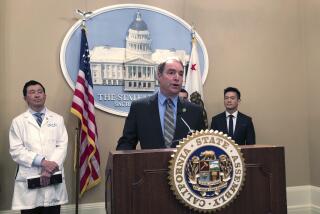Stop the Drugging of Our Children : Tobacco: Increase smoke-free areas, takes steps to reduce consumption and get the nicotine out of cigarettes.
- Share via
This year, some of the world’s most powerful corporations will hook millions of American children on a drug that is as addictive as heroin or cocaine--and far more deadly than either. Unless we act now, many of these children will die from their addiction decades from now.
The drug is nicotine. And the corporations are America’s tobacco companies.
The tobacco companies market image, but the cold statistics show that cigarettes kill nearly half a million Americans every year. The annual cost to our health-care system is tens of billions of dollars in preventable expenses.
The tobacco companies’ success--and the sickness and death that result--start with kids. The companies spend billions on advertising campaigns that entice young teen-agers to smoke. Each year hundreds of thousands of teen-agers become lifelong addicts, destined to die of lung cancer, heart disease and other tobacco-related causes.
Even those kids who reject cigarettes are not safe. Their health is threatened by exposure to other people’s tobacco smoke.
Despite the overwhelming evidence of the risks of smoking, the tobacco companies have been chillingly effective in stopping proposals to regulate the use of tobacco. It’s time to fight back. Four simple measures would protect all of us, especially our children:
The first and easiest step is a law requiring smoke-free public areas and workplaces. I have introduced the Smoke-Free Environment Act, which would restrict smoking to separately ventilated rooms in virtually all non-residential buildings. Last month, the federal Occupational Safety and Health Administration proposed to achieve the same result by regulation.
Enactment of the legislation or adoption of the OSHA regulation would produce enormous benefits at minimal cost. Nonsmoking people would be protected from carcinogenic tobacco smoke. Hundreds of thousands of asthmatic children could go to restaurants, bowling alleys and other public places without fear of a life-threatening attack. And building owners would save billions by avoiding the costs of cleaning up cigarette smoke and ashes. Even smokers would benefit, because quitting is much easier in smoke-free environments.
According to the federal Environmental Protection Agency, compliance with a national smoke-free policy in public and workplaces would, each year, save 38,000 to 108,000 lives and produce $11.5 billion to $29 billion in medical and economic savings--all for a cost of less than $1 billion annually.
The next two steps are to raise the tax on tobacco and to restrict cigarette advertising. These measures share a common goal: to protect health by reducing the consumption of cigarettes. According to some estimates, increasing the tax on a pack of cigarettes by $2 could reduce tobacco use by 23%, eventually save the lives of 2 million Americans and raise more than $23 billion each year for health-care reform.
The advertising restrictions are particularly important for children, who are the targets of cigarette ad campaigns featuring “Joe Camel” and Marlboro’s “Adventure Team.” The Tobacco Education and Child Protection Act, which I introduced last fall, would stop the tobacco industry’s most abusive tactics, such as advertising and distributing free samples near schools. New and bigger warning labels would also be required on all advertisements.
The last reform is to get nicotine out of cigarettes. Among adult smokers, 70% say they would quit if they could. Removing addictive nicotine from cigarettes would allow these smokers to choose for themselves whether to continue to smoke.
For children especially, nicotine-free cigarettes would be a literal lifesaver. If there were no nicotine, youthful experimentation with cigarettes would not lead to addiction.
These four reforms--all overdue--would end the special treatment tobacco companies receive from the federal government. And they may now be possible. Public sentiment is surging against the tobacco companies as never before. Almost daily another company or state or local government announces new restrictions on smoking. Indeed, last month, Congress passed legislation to ban smoking in schools, day-care centers and medical clinics that receive federal funding.
We must face a reality too long ignored and finally take decisive action against tobacco. Nothing less than the lives of hundreds of thousands of our children are at stake.
More to Read
Sign up for Essential California
The most important California stories and recommendations in your inbox every morning.
You may occasionally receive promotional content from the Los Angeles Times.













